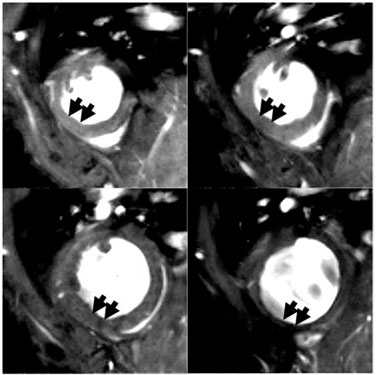News Release
SCIENCE HIGHLIGHTS of the 50th AAPM Meeting in Houston, July 27 to July 31
2. TRACKING STEM CELLS TO THE HEART

Figure 1: T2*-weighted short axis cardiac images. 4 days (top left), 7 days (top right) post-sham and 4 days (bottom left), 7 days (bottom right) post-MI. There is significant signal loss around the MI site 7 days post-MI, while the sham heart is relatively clean.
For several years, doctors have known that certain stem cells migrate to the heart after a heart attack, but exactly how they get there and what purpose they serve remained uncertain. Now for the first time, researchers have tracked the stem cells in mice using magnetic resonance imaging (MRI) from their bone marrow origin to the injured site. This opens up the possibility of finding some therapeutic treatment to direct these cells after a heart attack.
Mesenchymal stem cells, or MSCs, are found in the bone marrow and can differentiate into certain cell types. They have been detected around heart injuries following a myocardial infarction (heart attack), but whether they come to regenerate heart tissue or to promote healing is still under debate.
Using a series of MRI scans, Tom Hu (tom.cc.hu@gmail.com) and colleagues at the Medical College of Georgia in Augusta, GA, have tracked MSCs in a sample of mice. The researchers first transplanted into the bone marrow a few hundred thousand MSCs that had been labeled with both iron-oxide (a molecule that essentially shades out the MRI signal) and a special protein that fluoresces when exposed to blue light. The team then operated on all of the mice, inducing a heart attack in one group. Over the following days, MRI scans showed a gradual darkening around the site of injury in the heart attack group, which was presumably due to the arrival of the labeled MSCs. The researchers validated this migration with fluorescent microscopy.
The goal now is to devise a way to attach an MRI-sensitive marker to MSCs in humans who have suffered a heart attack. This would allow doctors to more closely study these cells, and perhaps devise treatments that can control their migration. Talk (TU-D-352-02), "Magnetic Resonance Imaging to Track Mesenchymal Stem Cells (MSCs) in a Murine Myocardial Infarction Model" is at 1:42 p.m. on Tuesday, July 29, 2008 in room 352. Abstract: http://www.aapm.org/meetings/amos2/pdf/35-9473-89709-126.pdf.
****************************************************************RELATED LINKS
- AAPM home page: http://www.aapm.org
- Abstracts and search form: http://www.aapm.org/meetings/08AM/MeetingProgram.asp
- Press Guide: http://www.aapm.org/meetings/08AM/VirtualPressRoom/
- Background article about how medical physics has revolutionized medicine:
http://www.newswise.com/articles/view/538208/
HOW TO COVER THE MEETING
Reporters who would like to attend the meeting in person should fill out the press registration form on the AAPM Virtual Press Room. See: http://www.aapm.org/meetings/08AM/VirtualPressRoom/documents/pressregform.pdf.
Reporters who would like to cover the conference remotely will find releases and articles on the Virtual Press Room highlighting many of the interesting and important talks presented at the meeting. Even if you can't make it to Houston, the Virtual Press Room will make it possible to write stories about the meeting from your desk.
ABOUT AAPM
The American Association of Physicists in Medicine (AAPM) is a scientific, educational, and professional nonprofit organization whose mission is to advance the application of physics to the diagnosis and treatment of human disease. The association encourages innovative research and development, helps disseminate scientific and technical information, fosters the education and professional development of medical physicists, and promotes the highest quality medical services for patients. In 2008, AAPM will celebrate its 50th year of serving patients, physicians, and physicists. Please visit the association's Web site at http://www.aapm.org/.
ABOUT AIP
Headquartered in College Park, MD., the American Institute of Physics is a not-for-profit membership corporation chartered in New York State in 1931 for the purpose of promoting the advancement and diffusion of the knowledge of physics and its application to human welfare.
####
Media contacts:
Jason Socrates Bardi, American Institute of Physics,
301-209-3091 (office) 858-775-4080 (cell)
jbardi@aip.org
Jeff Limmer, AAPM Media Relations Subcommittee Chair
jeffl@aspirus.org
